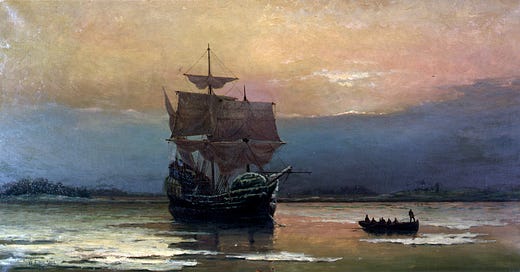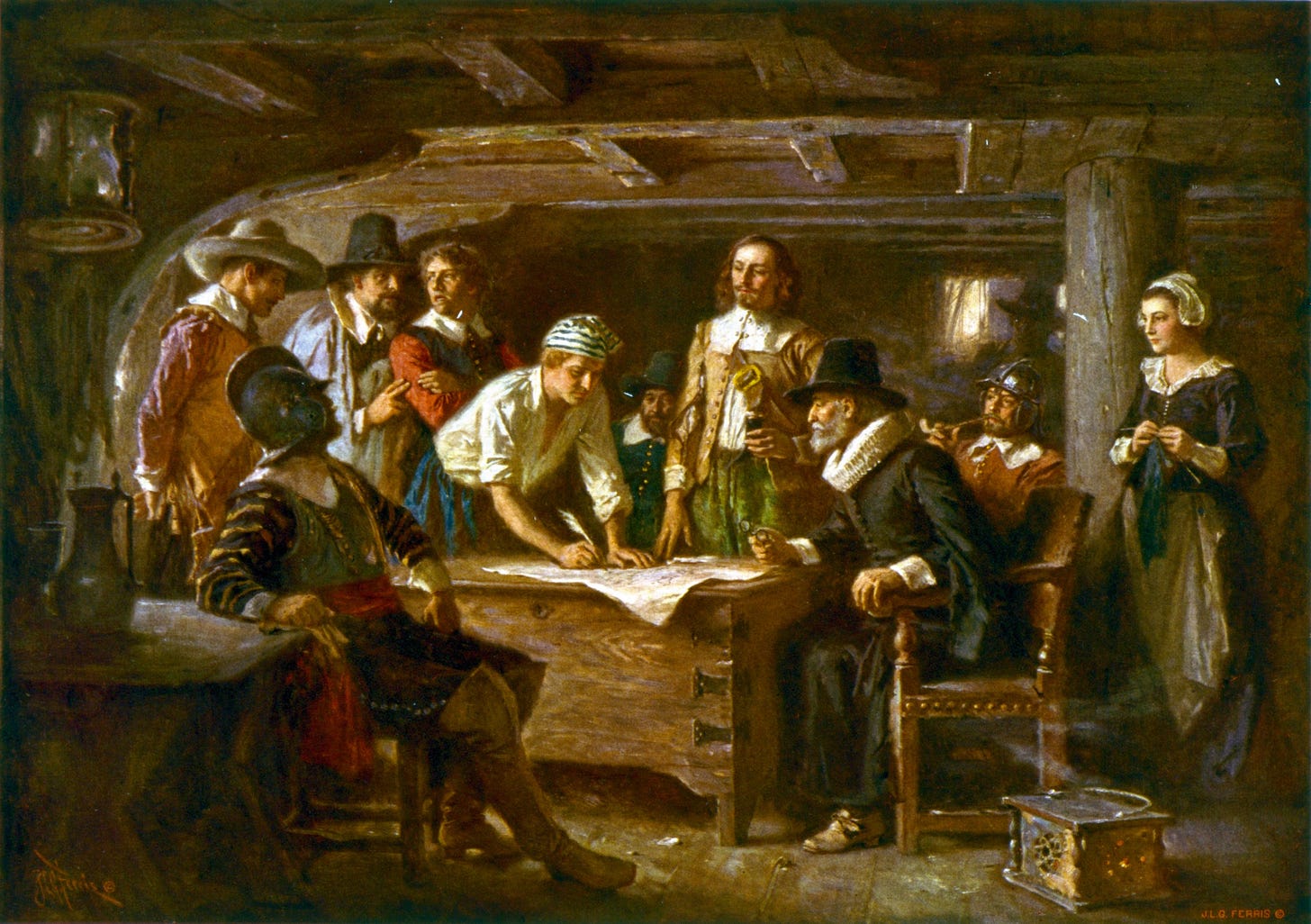Today, as families across the United States gather to celebrate Thanksgiving, my thoughts turn to my own connection to this day’s history. As a direct descendant of Degory Priest, one of the Mayflower passengers and signers of the Mayflower Compact, I always feel a special sense of gratitude and reflection when Thanksgiving rolls around. Degory Priest, my 10th great-grandfather and a hatter by trade, was among the faithful Pilgrims who risked everything to journey to the New World over 400 years ago, seeking the freedom to worship according to the dictates of their own conscience.1
This Thanksgiving, my family will sit at a table filled with an abundance of warm food and yummy desserts, in the comfort of a beautiful home, surrounded by loved ones spanning multiple generations. In stark contrast, the Pilgrims who arrived on the Mayflower in November 1620 endured unimaginable hardship, including lack of warm food, no yummy desserts, in the cramped and damp living quarters of the Mayflower, surrounded by frigid waters.
When the Mayflower’s 102 passengers anchored in Provincetown Harbor, within the hook at the northern tip of Cape Cod, they were already running low on food and provisions. It was too cold and wintry to begin settling on land immediately, so they remained aboard the ship. Small groups ventured ashore in dinghies to forage for sustenance, but conditions were dire. Disease and harsh weather took a devastating toll during that first winter, claiming the lives of nearly half the passengers, including Degory Priest.
Degory Priest died in January 1621, before he could set foot on the land he had sacrificed so much to reach. However, he lived long enough to sign the Mayflower Compact, a landmark agreement that set forth principles of self-governance. This compact, signed on November 21, 1620 (Old Style, November 11), was a revolutionary document. While pledging loyalty to King James I, the Compact also established a commitment to create just and equal laws for the good of the community—a cornerstone of democratic governance.
Degory Priest’s family remained in Europe while he journeyed ahead to establish a foothold in the New World. His wife, Sarah Allerton, and their two daughters, Mary (born 1611) and Sarah, planned to join him later. After his death, Sarah and their daughters eventually emigrated to Plymouth Colony. It is through his daughter Mary that I trace my lineage to Degory Priest.
Reflecting on his life, I am reminded of the courage and faith it took for him and others like him to embark on such a perilous journey. Degory Priest, the hatter, was an ordinary man with extraordinary resolve. Little did he know that his life would lead him to be involved in shaping much more than hats. As a signatory of the Mayflower Compact, he helped shape principles of democratic governance that later became part of the DNA of the American republic. His sacrifices and those of his fellow passengers laid the groundwork for the freedoms we enjoy today.
As we give thanks today, I honor the resilience and faith of those first Pilgrims, including my ancestor Degory Priest. Their sacrifices remind us that liberty is not easily won and that gratitude, even in the face of adversity, can sustain us through life’s challenges.
During the 300th anniversary of the Mayflower’s landing in 1920, then-Massachusetts Governor Calvin Coolidge gave remarks that I believe beautifully capture the story and spirit of the Mayflower Pilgrims.2 The full text is below.
Three centuries ago to-day the Pilgrims of the Mayflower made final landing at Plymouth Rock. They came not merely from the shores of the Old World. It will be in vain to search among recorded maps and history for their origin. They sailed up out of the infinite.
There was among them small trace of the vanities of life. They came undecked with orders of nobility. They were not children of fortune but of tribulation. Persecution, not preference, brought them hither; but it was a persecution in which they found a stern satisfaction. They cared little for titles; still less for the goods of this earth; but for an idea they would die. Measured by the standards of men of their time, they were the humble of the earth. Measured by later accomplishments, they were the mighty. In appearance weak and persecuted they came–rejected, despised–an insignificant band; in reality strong and independent, a mighty host of whom the world was not worthy, destined to free mankind. No captain ever led his forces to such a conquest. Oblivious to rank, yet men trace to them their lineage as to a royal house.
Forces not ruled by man had laid their unwilling course. As they landed, a sentinel of Providence, humbler, nearer to nature than themselves, welcomed them in their own tongue. They came seeking only an abiding-place on earth, “but lifted up their eyes to heaven, their dearest country,” says Governor Bradford, “where God hath prepared for them a city.” On that abiding faith has been reared an empire, magnificent beyond their dreams of Paradise.
Amid the solitude they set up hearthstone and altar; the home and the church. With arms in their hands they wrung from the soil their bread. With arms they gathered in the congregation to worship Almighty God. But they were armed, that in peace they might seek divine guidance in righteousness; not that they might prevail by force, but that they might do right though they perished.
What an increase, material and spiritual, three hundred years has brought that little company is known to all the earth. No like body ever cast so great an influence on human history. Civilization has made of their landing-place a shrine. Unto the Commonwealth of Massachusetts has been intrusted the keeping of that shrine. To her has come the precious heritage. It will be kept as it was created, or it will perish, not with an earthly pride but with a heavenly vision.
Plymouth Rock does not mark a beginning or an end. It marks a revelation of that which is without beginning and without end–a purpose, shining through eternity with a resplendent light, undimmed even by the imperfections of men; and a response, an answering purpose, from those who, oblivious, disdainful of all else, sailed hither seeking only for an avenue for the immortal soul.
http://mayflowerhistory.com/priest
https://coolidgefoundation.org/resources/the-pilgrims/






